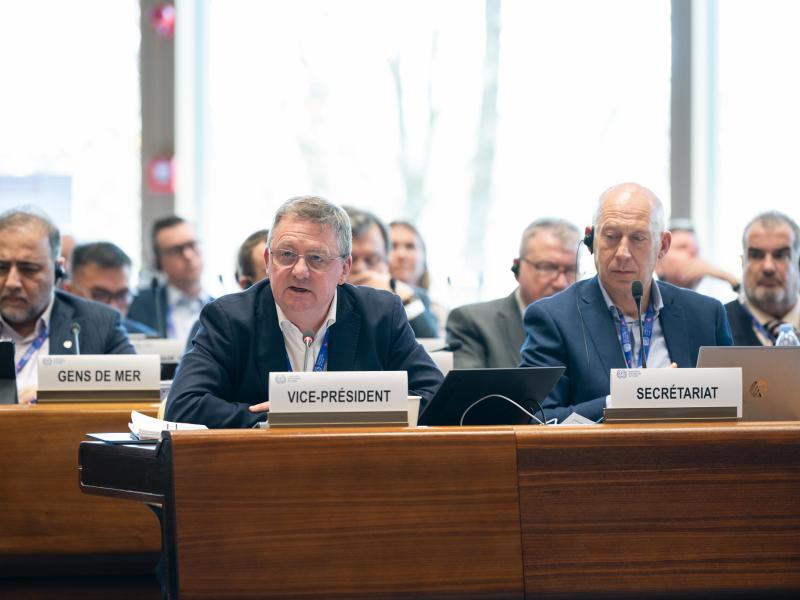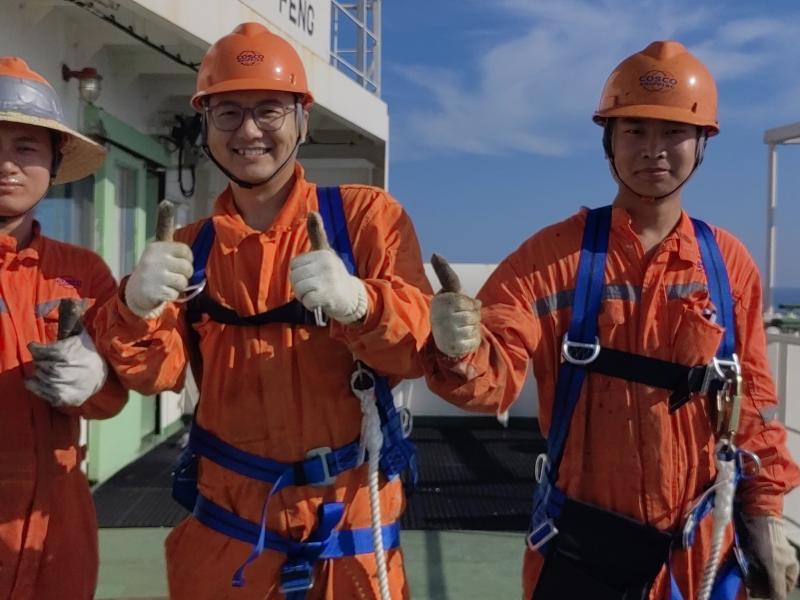Seafarers’ unions are extremely concerned that four Ukrainian nationals have now been detained without charge by Turkish authorities for more than seven months. The crew are being held over claims the seafarers knew about 176 kilograms of cocaine that was found by officials inside a shipping container onboard the MSC vessel that they were operating.
In July 2021, officials boarded the MSC Capucine R (IMO: 9210086) at Iskenderun, on Turkey’s Mediterranean coast. While on board the authorities broke the customs seal of the container in question, revealing the stash of cocaine inside. Authorities at once arrested the master and three deck officers and took the crew to a nearby prison.
Thanks to union and employer advocacy, the accused seafarers were released on bail in late August to a nearby hotel, supposedly to await charges and trial. In September, the crew’s families were permitted to come visit them.

But with charges still hanging over them and no trial in sight, the four seafarers remain blocked from leaving Turkey and returning to be with their families in Ukraine.
‘Highly unlikely’ seafarers knew of cocaine hoard
There are concerns by the unions which represent seafarers that the crew of the MSC Capucine could be being targeted by Turkish officials to take the blame for criminals for the attempted drugs import. Unions say it is highly unlikely that the seafarers aboard the vessel knew of the drugs cargo onboard. That’s because standard practice is for containers to be sealed before they are loaded on to a vessel at the originating port to prevent tampering, only being unsealed at the destination port. This process means that crew typically have no knowledge of, let alone access to, the contents of containers (unless the cargo is clearly labelled as hazardous, such as liquid fuels which can be volatile).
Employers, unions working for the seafarers’ access to justice
The move by Turkish officials to arrest the four seafarers in July came as a shock to seafarers’ unions and to their employer - Swiss-Italian shipowner Mediterranean Shipping Company (MSC). MSC is one of the two largest container ship operators in the world, with the company shifting about 23 million containers every year between more than 500 locations onboard more than 600 vessels. The company is said to be extremely concerned about the initial treatment of the crew, although improvements have been secured in the last month.
The International Transport Workers’ Federation (ITF) continues to work with Turkish-based affiliate union TDS, and the Ukrainian seafarers’ home union - the MTWTU. The unions and MSC are united in wanting to see the seafarers either finally face court on the charges that continue to hang over them or be released.
“It’s really a case of the Turkish officials needing to put up whatever evidence they have on these seafarers,” said Stephen Cotton, General Secretary of the ITF. “If the evidence isn’t there – and you have to ask whether it is, considering how long it has taken to get this trial underway – then the Turkish authorities should throw out the charges and release these seafarers today.”

“Turkey has done the right thing by preventing these seafarers from rotting on remand, but we need to see more action from the officials in Turkey for the country to live up to its potential as an upholder of natural justice. It would be disappointing for Turkey to allow what appears to be the unfair criminalisation of these seafarers to continue without intervention,” said Cotton.
Cotton said the joint effort to support and release the seafarers was an important example of how responsible employers and labour organisations can come together for good outcomes.
“Since the day the captain and deck officers of the MSC Capucine R were arrested the ITF has been working closely with our brothers and sisters in the TDS and MTWTU and our partners in MSC to see the seafarers have proper treatment, access to justice and a speedy trial or release. There has been progress for these seafarers thanks to the work we have been undertaking on their behalf,” Cotton said.

Turkey needs to be fair to visiting seafarers – TDS union
The plight of the Ukrainians has received the attention and international solidarity of the Seafarers' Union of Turkey (Türkiye Denizciler Sendikası, or TDS).
“We want Turkey to be a welcoming place for seafarers,” said Irfan Mete, President of TDS. “We don’t want our country to be a place where crew are fearful of calling into. Frankly, this has been a challenging time for Turkey’s reputation amongst seafarers internationally.”

“We will continue working behind the scenes to encourage the authorities to urgently progress this case. Together, we can ensure Turkey has a reputation as a fair, welcoming port State for all visiting seafarers. As a maritime nation at the crossroads of the world, we must,” said Irfan Mete.
We want our seafarers home - MTWTU
Meanwhile, 1,605 kilometres north of Iskenderun, the families of the four detained Ukrainian seafarers continue to be worried about the fate of their husbands and fathers. Families get regular updates through the seafarer’s ITF-affiliated union, the Marine Transport Workers’ Trade Union of Ukraine (MTWTU - Професійна спілка робітників морського).
“We want our seafarers home,” said MTWTU chairman Oleg Grygoriuk. “No seafarer should be criminalised just for doing our job. No seafarer should be put in the position when they cannot say for sure to their families when they will be home next. The uncertainty this situation brings is as much a sentence for the families as it is for the seafarers.”

“The MTWTU is very grateful to all those working for just outcomes for the seafarers, including our brothers and sisters in the TDS and the ITF secretariat, and from the shipowner’s side also. This case shows the value of international solidarity. By being in the ITF family we can come together to see the proper outcome reached,” said Grygoriuk.
What is criminalisation – and why is it a problem?
Seafarers’ unions argue there is a bigger picture to see when considering what is happening to the Ukrainian seafarers trapped in south-eastern Turkey. Seafarers globally are facing a ‘rising trend of criminalisation’, they say, and are being targeted by local law enforcement around the world for their alleged involvement in sophisticated drug trafficking operations – even when there’s no evidence.
In a pattern now familiar to the seafarers’ representatives, police and customs officials that are unable or unwilling to bring down the real powers behind crimes like drug trafficking attempt to blame visiting seafarers, whose only crime often is to be at their place of work (a vessel) when drugs are uncovered onboard by officials. Shockingly, seafarers have even been blamed when they themselves reported illegal cargo on board to authorities.
“Of course, we recognise governments’ mandate to investigate and prosecute real crimes by real perpetrators,” said the ITF’s Seafarers’ Section chair, David Heindel. “But what we are seeing with increasing frequency that it is innocent seafarers in the firing line when local officials need someone to blame.”
Heindel said criminalisation occurs when seafarers are charged, detained, or punished for criminal offences that port state authorities (such as local customs or police) allege the seafarer is guilty of (typically in relation to an incident or accident that has taken place while they have been working).
When a seafarer is ‘criminalised’, it can mean they are denied due process. Authorities may be slow to lay charges against the seafarers, and once finally laid, courts can be slow to hear those charges. Lack of due process can include poor access to bail, or inadequate legal support available to the crew. A lack of warm, dry and safe detention facilities can also be an issue.
“Given seafarers can be thousands of miles from home when they’re arrested, and often not speaking the local language, they are in a very vulnerable position if local authorities do not treat them with fairness,” said Heindel.
“We need every country to have justice systems that are quick to intervene if police or customs officials get it wrong. If courts and judges throw out phony charges swiftly, in a matter of hours or days, rather than taking weeks or months, then a lot of suffering could be avoided. But the reality is that the justice systems in some of these places are too slow to act. That is not acceptable. As the saying goes; justice delayed is justice denied,” said Heindel.
END
About the ITF: The International Transport Workers’ Federation (ITF) is a democratic, affiliate-led federation recognised as the world’s leading transport authority. We fight passionately to improve working lives; connecting trade unions from 147 countries to secure rights, equality and justice for their members. We are the voice for nearly 20 million working women and men in the transport industry across the world.
Media contact: media[at]itf.org.uk +44 20 7940 9282



